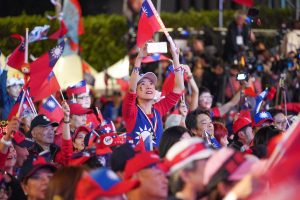Taiwan presidential candidate Han Kuo-yu of the opposition Kuomintang (KMT) held a major rally outside Taipei’s presidential office on Thursday as his party’s deputy secretary-general, Alex Tsai, found himself in the center of a last-minute scandal involving self-proclaimed Chinese spy Wang Liqiang.
Han brought out party heavyweights, including former President Ma Ying-jeou, and shouted to supporters that removing the ruling Democratic Progressive Party (DPP) and building warmer ties with China would return Taiwan to economic glory.
It’s the central message of a campaign highly likely to fail, as President Tsai Ing-wen held a commanding lead on January 1, the last day figures were released prior to a 10-day pre-election poll blackout.
The incumbent, who encouraged supporters on Thursday night not to doubt their choice, has presented herself as committed to protecting Taiwan’s democracy as Han fails to shake off criticism that his visions of economic enmeshment with China would jeopardize the country’s sovereignty.
Wednesday reports by The Age and The Sydney Morning Herald didn’t help matters for Han and the KMT. According to the reports, Wang allegedly received multiple threats ordering him to release a video retracting the claims he made in November of Chinese interference operations in Australia, Hong Kong, and Taiwan, and instead falsely implicate Tsai Ing-wen and the DPP in corruption.
The Age reported the directives were coordinated by Alex Tsai (no relation to Tsai Ing-wen), considered to be close to Beijing, and a Chinese businessman named Sun Tianqin.
The newspapers received messages showing Tsai offering safe passage to Taiwan organized by the KMT. Sun allegedly warned Wang that, should he not cooperate, he could be extradited to China or killed.
According to The Age, Wang was given a script stating that he had made his spy allegations because he had been promised that the DPP “would guarantee that it would give me a large sum of money and sort out my asylum application in Australia or help me settle in Taiwan.”
Wang instead told Australian police about the threats and has gone into hiding, according to the reports.
The Age reported Thursday that Australian police had briefed Taiwanese authorities on the plot, sharing the messages and conversations allegedly coercing Wang to falsely implicate the DPP.
The briefing appears to contradict statements made earlier Thursday by Alex Tsai, who held a press conference denying the allegations but admitting he had spoken to Wang by phone multiple times.
Tsai claimed that Sun had been trying to protect his friend Xiang Xin, the executive director of Hong Kong-based China Innovation Investment who was central to Wang’s November allegations.
Tsai denied that Wang is a spy and claimed that Wang had told Sun he would retract his allegations if he were paid.
DPP officials held their own news conference on Thursday afternoon at which presidential campaign spokeswoman Chien Shu-pei accused Tsai of trying to “use intimidation and enticement to press Wang to recant his statement about spying, and then say he was bought off by the DPP.”
Kuan Bi-ling, a DPP legislator, denied a claim made by Tsai that DPP secretary-general Chiou I-jen had traveled to Australia to offer Wang money.
In a statement, Chiou said “the KMT has resorted to rumors, conjecture and false accusations” and said he had never visited Australia.
The reports added new fuel to an election that is centered heavily on the looming threat of Beijing. On December 31, the DPP passed an anti-infiltration act targeting Chinese influence in the country.
The KMT has accused the DPP of scare tactics by associating the KMT with the Chinese Communist Party. KMT officials have harshly criticized the anti-infiltration act, claiming that it threatens Taiwan’s democracy.
DPP officials, meanwhile, have warned of Chinese influence in Taiwan’s media and political discourse ahead of Saturday’s presidential and legislative elections.
Taiwanese authorities are already investigating Wang’s November claims, in which he said he was instructed to conduct political interference operations in the upcoming Taiwan elections.
Wang’s claims have not been verified, but they appear set to dominate Taiwan’s domestic news cycle just one day before the country goes to the polls.

































